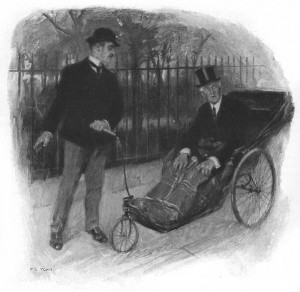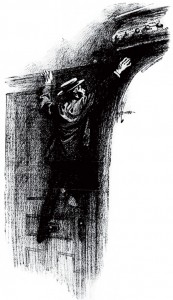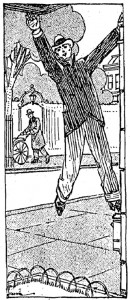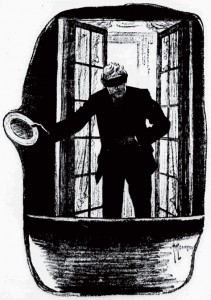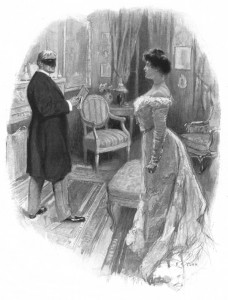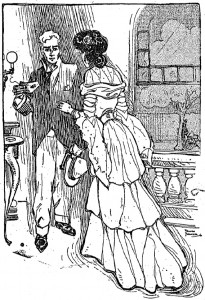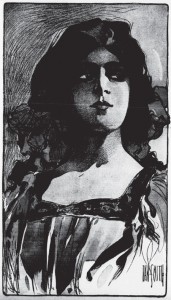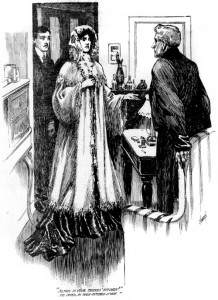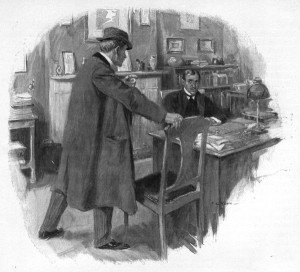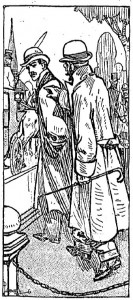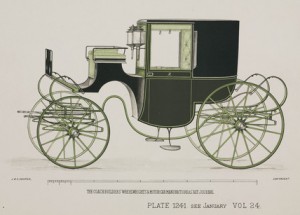This story was first published in Scribner’s Magazine in the June 1901 issue.
I
The square shall be nameless, but if you drive due west from Piccadilly the cab-man will eventually find it on his left, and he ought to thank you for two shillings. It is not a fashionable square, but there are few with a finer garden, while the studios on the south side lend distinction of another sort. The houses, however, are small and dingy, and about the last to attract the expert practitioner in search of a crib. Heaven knows it was with no such thought I trailed Raffles thither, one unlucky evening at the latter end of that same season, when Dr. Theobald had at last insisted upon the bath-chair which I had foreseen in the beginning. Trees whispered in the green garden aforesaid, and the cool, smooth lawns looked so inviting that I wondered whether some philanthropic resident could not be induced to lend us the key1. But Raffles would not listen to the suggestion, when I stopped to make it, and what was worse, I found him looking wistfully at the little houses instead.
“Such balconies, Bunny! A leg up, and there you would be!”
I expressed a conviction that there would be nothing worth taking in the square, but took care to have him under way again as I spoke.
“I daresay you’re right,” sighed Raffles. “Rings and watches, I suppose, but it would be hard luck to take them from people who live in houses like these. I don’t know, though. Here’s one with an extra story. Stop, Bunny; if you don’t stop I’ll hold on to the railings! This is a good house; look at the knocker and the electric bell. They’ve had that put in. There’s some money here, my rabbit! I dare bet there’s a silver-table in the drawing-room; and the windows are wide open. Electric light, too, by Jove!2”
Since stop I must, I had done so on the other side of the road, in the shadow of the leafy palings, and as Raffles spoke the ground floor windows opposite had flown alight, showing as pretty a little dinner-table as one could wish to see, with a man at his wine at the far end, and the back of a lady in evening dress toward us. It was like a lantern-picture thrown upon a screen. There were only the pair of them, but the table was brilliant with silver and gay with flowers, and the maid waited with the indefinable air of a good servant. It certainly seemed a good house.
“She’s going to let down the blind!” whispered Raffles, in high excitement. “No, confound them, they’ve told her not to. Mark down her necklace, Bunny, and invoice his stud. What a brute he looks! But I like the table, and that’s her show. She has the taste; but he must have money. See the festive picture over the sideboard? Looks to me like a Jacques Saillard. But that silver-table would be good enough for me.”
“Get on,” said I. “You’re in a bath-chair.”
“But the whole square’s at dinner! We should have the ball at our feet. It wouldn’t take two twos!”
“With those blinds up, and the cook in the kitchen underneath?”
He nodded, leaning forward in the chair, his hands upon the wraps about his legs.
“You must be mad,” said I, and got back to my handles with the word, but when I tugged the chair ran light3.
“Keep an eye on the rug,” came in a whisper from the middle of the road; and there stood my invalid, his pale face in a quiver of pure mischief, yet set with his insane resolve. “I’m only going to see whether that woman has a silver-table—”
“We don’t want it—”
“It won’t take a minute—”
“It’s madness, madness—”
“Then don’t you wait!”
It was like him to leave me with that, and this time I had taken him at his last word had not my own given me an idea. Mad I had called him, and mad I could declare him upon oath if necessary. It was not as though the thing had happened far from home. They could learn all about us at the nearest mansions. I referred them to Dr. Theobald; this was a Mr. Maturin, one of his patients, and I was his keeper, and he had never given me the slip before. I heard myself making these explanations on the doorstep, and pointing to the deserted bath-chair as the proof, while the pretty parlor maid ran for the police. It would be a more serious matter for me than for my charge. I should lose my place. No, he had never done such a thing before, and I would answer for it that he never should again.
I saw myself conducting Raffles back to his chair, with a firm hand and a stern tongue. I heard him thanking me in whispers on the way home. It would be the first tight place I had ever got him out of, and I was quite anxious for him to get into it, so sure was I of every move. My whole position had altered in the few seconds that it took me to follow this illuminating train of ideas; it was now so strong that I could watch Raffles without much anxiety. And he was worth watching.
He had stepped boldly but softly to the front door, and there he was still waiting, ready to ring if the door opened or a face appeared in the area, and doubtless to pretend that he had rung already. But he had not to ring at all; and suddenly I saw his foot in the letter-box4, his left hand on the lintel overhead. It was thrilling, even to a hardened accomplice with an explanation up his sleeve! A tight grip with that left hand of his, as he leant backward with all his weight upon those five fingers; a right arm stretched outward and upward to its last inch; and the base of the low, projecting balcony was safely caught.
I looked down and took breath. The maid was removing the crumbs in the lighted room, and the square was empty as before. What a blessing it was the end of the season5! Many of the houses remained in darkness. I looked up again, and Raffles was drawing his left leg over the balcony railing. In another moment he had disappeared through one of the French windows which opened upon the balcony, and in yet another he had switched on the electric light within. This was bad enough, for now I, at least, could see everything he did; but the crowning folly was still to come. There was no point in it; the mad thing was done for my benefit, as I knew at once and he afterward confessed; but the lunatic reappeared on the balcony, bowing like a mountebank—in his crape mask!
I set off with the empty chair, but I came back. I could not desert old Raffles, even when I would, but must try to explain away his mask as well, if he had not the sense to take it off in time. It would be difficult, but burglaries are not usually committed from a bath-chair, and for the rest I put my faith in Dr. Theobald. Meanwhile Raffles had at least withdrawn from the balcony, and now I could only see his head as he peered into a cabinet at the other side of the room. It was like the opera of Aida, in which two scenes are enacted simultaneously, one in the dungeon below, the other in the temple above. In the same fashion my attention now became divided between the picture of Raffles moving stealthily about the upper room, and that of the husband and wife at table underneath. And all at once, as the man replenished his glass with a shrug of the shoulders, the woman pushed back her chair and sailed to the door.
Raffles was standing before the fireplace upstairs. He had taken one of the framed photographs from the chimney-piece, and was scanning it at suicidal length through the eye-holes in the hideous mask which he still wore. He would need it after all. The lady had left the room below, opening and shutting the door for herself; the man was filling his glass once more6. I would have shrieked my warning to Raffles, so fatally engrossed overhead, but at this moment (of all others) a constable (of all men) was marching sedately down our side of the square. There was nothing for it but to turn a melancholy eye upon the bath-chair, and to ask the constable the time. I was evidently to be kept there all night, I remarked, and only realized with the words that they disposed of my other explanations before they were uttered. It was a horrible moment for such a discovery. Fortunately the enemy was on the pavement, from which he could scarcely have seen more than the drawing-room ceiling, had he looked; but he was not many houses distant when a door opened and a woman gasped so that I heard both across the road. And never shall I forget the subsequent tableaux in the lighted room behind the low balcony and the French windows.
Raffles stood confronted by a dark and handsome woman whose profile, as I saw it first in the electric light, is cut like a cameo in my memory. It had the undeviating line of brow and nose, the short upper lip, the perfect chin, that are united in marble oftener than in the flesh; and like marble she stood, or rather like some beautiful pale bronze; for that was her coloring, and she lost none of it that I could see, neither trembled; but her bosom rose and fell, and that was all. So she stood without flinching before a masked ruffian, who, I felt, would be the first to appreciate her courage; to me it was so superb that I could think of it in this way even then, and marvel how Raffles himself could stand unabashed before so brave a figure. He had not to do so long. The woman scorned him, and he stood unmoved, a framed photograph still in his hand. Then, with a quick, determined movement she turned, not to the door or to the bell, but to the open window by which Raffles had entered; and this with that accursed policeman still in view. So far no word had passed between the pair. But at this point Raffles said something, I could not hear what, but at the sound of his voice the woman wheeled. And Raffles was looking humbly in her face, the crape mask snatched from his own.
“Arthur!” she cried; and that might have been heard in the middle of the square garden.
Then they stood gazing at each other, neither unmoved any more, and while they stood the street-door opened and banged. It was her husband leaving the house, a fine figure of a man, but a dissipated face, and a step even now distinguished by the extreme caution which precedes unsteadiness. He broke the spell. His wife came to the balcony, then looked back into the room, and yet again along the road, and this time I saw her face. It was the face of one glancing indeed from Hyperion to a satyr7. And then I saw the rings flash, as her hand fell gently upon Raffles’s arm.
They disappeared from that window. Their heads showed for an instant in the next. Then they dipped out of sight, and an inner ceiling flashed out under a new light; they had gone into the back drawing-room, beyond my ken. The maid came up with coffee, her mistress hastily met her at the door, and once more disappeared. The square was as quiet as ever. I remained some minutes where I was. Now and then I thought I heard their voices in the back drawing-room. I was seldom sure.
My state of mind may be imagined by those readers who take an interest in my personal psychology. It does not amuse me to look back upon it. But at length I had the sense to put myself in Raffles’s place. He had been recognized at last, he had come to life. Only one person knew as yet, but that person was a woman, and a woman who had once been fond of him, if the human face could speak. Would she keep his secret? Would he tell her where he lived? It was terrible to think we were such neighbors, and with the thought that it was terrible came a little enlightenment as to what could still be done for the best. He would not tell her where he lived. I knew him too well for that. He would run for it when he could, and the bath-chair and I must not be there to give him away. I dragged the infernal vehicle round the nearer corner. Then I waited—there could be no harm in that—and at last he came.
He was walking briskly, so I was right, and he had not played the invalid to her; yet I heard him cry out with pleasure as he turned the corner, and he flung himself into the chair with a long-drawn sigh that did me good.
“Well done, Bunny—well done! I am on my way to Earl’s Court, she’s capable of following me, but she won’t look for me in a bath-chair. Home, home, home, and not another word till we get there!”
Capable of following him? She overtook us before we were past the studios on the south side of the square, the woman herself, in a hooded opera-cloak. But she never gave us a glance, and we saw her turn safely in the right direction for Earl’s Court, and the wrong one for our humble mansions. Raffles thanked his gods in a voice that trembled, and five minutes later we were in the flat. Then for once it was Raffles who filled the tumblers and found the cigarettes, and for once (and once only in all my knowledge of him) did he drain his glass at a draught.
“You didn’t see the balcony scene?” he asked at length; and they were his first words since the woman passed us on his track.
“Do you mean when she came in?”
“No, when I came down.”
“I didn’t.”
“I hope nobody else saw it,” said Raffles devoutly. “I don’t say that Romeo and Juliet were brother and sister to us. But you might have said so, Bunny!”
He was staring at the carpet with as wry a face as lover ever wore.
“An old flame?” said I, gently.
“A married woman,” he groaned.
“So I gathered.”
“But she always was one, Bunny,” said he, ruefully. “That’s the trouble. It makes all the difference in the world!”
I saw the difference, but said I did not see how it could make any now. He had eluded the lady, after all; had we not seen her off upon a scent as false as scent could be? There was occasion for redoubled caution in the future, but none for immediate anxiety. I quoted the bedside Theobald, but Raffles did not smile. His eyes had been downcast all this time, and now, when he raised them, I perceived that my comfort had been administered to deaf ears.
“Do you know who she is?” said he.
“Not from Eve.”
“Jacques Saillard,” he said, as though now I must know.
But the name left me cold and stolid. I had heard it, but that was all. It was lamentable ignorance, I am aware, but I had specialized in Letters at the expense of Art.
“You must know her pictures,” said Raffles, patiently; “but I suppose you thought she was a man. They would appeal to you, Bunny; that festive piece over the sideboard was her work. Sometimes they risk her at the Academy, sometimes they fight shy. She has one of those studios in the same square; they used to live up near Lord’s.”
My mind was busy brightening a dim memory of nymphs reflected in woody pools. “Of course!” I exclaimed, and added something about “a clever woman.” Raffles rose at the phrase.
“A clever woman!” he echoed, scornfully; “if she were only that I should feel safe as houses. Clever women can’t forget their cleverness, they carry it as badly as a boy does his wine, and are about as dangerous. I don’t call Jacques Saillard clever outside her art, but neither do I call her a woman at all. She does man’s work over a man’s name8, has the will of any ten men I ever knew, and I don’t mind telling you that I fear her more than any person on God’s earth. I broke with her once,” said Raffles, grimly, “but I know her. If I had been asked to name the one person in London by whom I was keenest not to be bowled out, I should have named Jacques Saillard.”9
That he had never before named her to me was as characteristic as the reticence with which Raffles spoke of their past relations, and even of their conversation in the back drawing-room that evening. It was a question of principle with him, and one that I like to remember. “Never give a woman away, Bunny,” he used to say; and he said it again to-night, but with a heavy cloud upon him, as though his chivalry was sorely tried.
“That’s all right,” said I, “if you’re not going to be given away yourself.”
“That’s just it, Bunny! That’s just—”
The words were out of him, it was too late to recall them. I had hit the nail upon the head.
“So she threatened you,” I said, “did she?”
“I didn’t say so,” he replied, coldly.
“And she is mated with a clown10!” I pursued.
“How she ever married him,” he admitted, “is a mystery to me.”
“It always is,” said I, the wise man for once, and rather enjoying the rôle.
“Southern blood?”
“Spanish.11”
“She’ll be pestering you to run off with her, old chap,” said I.
Raffles was pacing the room. He stopped in his stride for half a second. So she had begun pestering him already! It is wonderful how acute any fool can be in the affairs of his friend. But Raffles resumed his walk without a syllable, and I retreated to safer ground.
“So you sent her to Earl’s Court,” I mused aloud; and at last he smiled.
“You’ll be interested to hear, Bunny,” said he, “that I am now living in Seven Dials12, and Bill Sikes couldn’t hold a farthing dip to me13. Bless you, she had my old police record at her fingers’ ends, but it was fit to frame compared with the one I gave her. I had sunk as low as they dig. I divided my nights between the open parks and a thieves’ kitchen in Seven Dials. If I was decently dressed it was because I had stolen the suit down the Thames Valley beat the night before last. I was on my way back when first that sleepy square, and then her open window, proved too much for me. You should have heard me beg her to let me push on to the devil in my own way; there I spread myself, for I meant every word; but I swore the final stage would be a six-foot drop.”
“You did lay it on,” said I.
“It was necessary, and that had its effect. She let me go. But at the last moment she said she didn’t believe I was so black as I painted myself, and then there was the balcony scene you missed.”
So that was all. I could not help telling him that he had got out of it better than he deserved for ever getting in. Next moment I regretted the remark.
“If I have got out of it,” said Raffles, doubtfully. “We are dreadfully near neighbors, and I can’t move in a minute, with old Theobald taking a grave view of my case. I suppose I had better lie low, and thank the gods again for putting her off the scent for the time being.”
No doubt our conversation was carried beyond this point, but it certainly was not many minutes later, nor had we left the subject, when the electric bell thrilled us both to a sudden silence.
“The doctor?” I queried, hope fighting with my horror.
“It was a single ring14.”
“The last post?”
“You know he knocks, and it’s long past his time.”
The electric bell rang again, but now as though it never would stop.
“You go, Bunny,” said Raffles, with decision. His eyes were sparkling. His smile was firm.
“What am I to say?”
“If it’s the lady let her in.”
It was the lady, still in her evening cloak, with her fine dark head half-hidden by the hood, and an engaging contempt of appearances15 upon her angry face. She was even handsomer than I had thought, and her beauty of a bolder type, but she was also angrier than I had anticipated when I came so readily to the door. The passage into which it opened was an exceedingly narrow one, as I have often said, but I never dreamt of barring this woman’s way, though not a word did she stoop to say to me. I was only too glad to flatten myself against the wall, as the rustling fury strode past me into the lighted room with the open door.
“So this is your thieves’ kitchen!” she cried, in high-pitched scorn.
I was on the threshold myself, and Raffles glanced towards me with raised eyebrows.
“I have certainly had better quarters in my day,” said he, “but you need not call them absurd names before my man.”
“Then send your ‘man’ about his business,” said Jacques Saillard, with an unpleasant stress upon the word indicated.
But when the door was shut I heard Raffles assuring her that I knew nothing, that he was a real invalid overcome by a sudden mad temptation, and all he had told her of his life a lie to hide his whereabouts, but all he was telling her now she could prove for herself without leaving that building. It seemed, however, that she had proved it already by going first to the porter below stairs. Yet I do not think she cared one atom which story was the truth.
“So you thought I could pass you in your chair,” she said, “or ever in this world again, without hearing from my heart that it was you!”
II
“Bunny,” said Raffles, “I’m awfully sorry, old chap, but you’ve got to go.”
It was some weeks since the first untimely visitation of Jacques Saillard, but there had been many others at all hours of the day, while Raffles had been induced to pay at least one to her studio in the neighboring square. These intrusions he had endured at first with an air of humorous resignation which imposed upon me less than he imagined. The woman meant well, he said, after all, and could be trusted to keep his secret loyally. It was plain to me, however, that Raffles did not trust her, and that his pretence upon the point was a deliberate pose to conceal the extent to which she had him in her power. Otherwise there would have been little point in hiding anything from the one person in possession of the cardinal secret of his identity. But Raffles thought it worth his while to hoodwink Jacques Saillard in the subsidiary matter of his health, in which Dr. Theobald lent him unwitting assistance, and, as we have seen, to impress upon her that I was actually his attendant, and as ignorant of his past as the doctor himself. “So you’re all right, Bunny,” he had assured me; “she thinks you knew nothing the other night. I told you she wasn’t a clever woman outside her work. But hasn’t she a will!” I told Raffles it was very considerate of him to keep me out of it, but that it seemed to me like tying up the bag when the cat had escaped. His reply was an admission that one must be on the defensive with such a woman and in such a case. Soon after this, Raffles, looking far from well, fell back upon his own last line of defence, namely, his bed; and now, as always in the end, I could see some sense in his subtleties, since it was comparatively easy for me to turn even Jacques Saillard from the door, with Dr. Theobald’s explicit injunctions, and with my own honesty unquestioned. So for a day we had peace once more. Then came letters, then the doctor again and again, and finally my dismissal in the incredible words which have necessitated these explanations.
“Go?” I echoed. “Go where?”
“It’s that ass Theobald,” said Raffles. “He insists.”
“On my going altogether?”
He nodded.
“And you mean to let him have his way?”
I had no language for my mortification and disgust, though neither was as yet quite so great as my surprise. I had foreseen almost every conceivable consequence of the mad act which brought all this trouble to pass, but a voluntary division between Raffles and me had certainly never entered my calculations. Nor could I think that it had occurred to him before our egregious doctor’s last visit, this very morning. Raffles had looked irritated as he broke the news to me from his pillow, and now there was some sympathy in the way he sat up in bed, as though he felt the thing himself.
“I am obliged to give in to the fellow,” said he. “He’s saving me from my friend, and I’m bound to humor him. But I can tell you that we’ve been arguing about you for the last half hour, Bunny. It was no use; the idiot has had his knife in you from the first; and he wouldn’t see me through on any other conditions.”
“So he is going to see you through, is he?”
“It tots up16 to that,” said Raffles, looking at me rather hard. “At all events he has come to my rescue for the time being, and it’s for me to manage the rest. You don’t know what it has been, Bunny, these last few weeks; and gallantry forbids that I should tell you even now. But would you rather elope against your will, or have your continued existence made known to the world in general and the police in particular? That is practically the problem which I have had to solve, and the temporary solution was to fall ill. As a matter of fact, I am ill; and now what do you think? I owe it to you to tell you, Bunny, though it goes against the grain. She would take me ‘to the dear, warm underworld, where the sun really shines,’ and she would ‘nurse me back to life and love!’ The artistic temperament is a fearsome thing, Bunny, in a woman with the devil’s own will!”
Raffles tore up the letter from which he had read these piquant extracts, and lay back on the pillows with the tired air of the veritable invalid which he seemed able to assume at will. But for once he did look as though bed was the best place for him; and I used the fact as an argument for my own retention in defiance of Dr. Theobald. The town was full of typhoid, I said, and certainly that autumnal scourge was in the air. Did he want me to leave him at the very moment when he might be sickening for a serious illness?
“You know I don’t, my good fellow,” said Raffles, wearily; “but Theobald does, and I can’t afford to go against him now. Not that I really care what happens to me now that that woman knows I’m in the land of the living; she’ll let it out, to a dead certainty, and at the best there’ll be a hue and cry, which is the very thing I have escaped all these years. Now, what I want you to do is to go and take some quiet place somewhere, and then let me know, so that I may have a port in the storm when it breaks.”
“Now you’re talking!” I cried, recovering my spirits. “I thought you meant to go and drop a fellow altogether!”
“Exactly the sort of thing you would think,” rejoined Raffles, with a contempt that was welcome enough after my late alarm. “No, my dear rabbit, what you’ve got to do is to make a new burrow for us both. Try down the Thames, in some quiet nook that a literary man would naturally select. I’ve often thought that more use might be made of a boat, while the family are at dinner, than there ever has been yet. If Raffles is to come to life, old chap, he shall go a-Raffling for all he’s worth! There’s something to be done with a bicycle, too. Try Ham Common or Roehampton, or some such sleepy hollow a trifle off the line; and say you’re expecting your brother from the colonies.”
Into this arrangement I entered without the slightest hesitation, for we had funds enough to carry it out on a comfortable scale, and Raffles placed a sufficient share at my disposal for the nonce. Moreover, I for one was only too glad to seek fresh fields and pastures new17—a phrase which I determined to interpret literally in my choice of fresh surroundings. I was tired of our submerged life in the poky little flat, especially now that we had money enough for better things. I myself of late had dark dealings with the receivers, with the result that poor Lord Ernest Belville’s successes were now indeed ours. Subsequent complications had been the more galling on that account, while the wanton way in which they had been created was the most irritating reflection of all. But it had brought its own punishment upon Raffles, and I fancied the lesson would prove salutary when we again settled down.
“If ever we do, Bunny!” said he, as I took his hand and told him how I was already looking forward to the time.
“But of course we will!” I cried, concealing the resentment at leaving him which his tone and his appearance renewed in my breast.
“I’m not so sure of it,” he said, gloomily. “I’m in somebody’s clutches, and I’ve got to get out of them first.”
“I’ll sit tight until you do.”
“Well,” he said, “if you don’t see me in ten days you never will.”
“Only ten days?” I echoed. “That’s nothing at all.”
“A lot may happen in ten days,” replied Raffles, in the same depressing tone, so very depressing in him; and with that he held out his hand a second time, and dropped mine suddenly after as sudden a pressure for farewell.
I left the flat in considerable dejection after all, unable to decide whether Raffles was really ill, or only worried as I knew him to be. And at the foot of the stairs the author of my dismissal, that confounded Theobald, flung open his door and waylaid me.
“Are you going?” he demanded.
The traps in my hands proclaimed that I was, but I dropped them at his feet to have it out with him then and there.
“Yes,” I answered fiercely, “thanks to you!”
“Well, my good fellow,” he said, his full-blooded face lightening and softening at the same time, as though a load were off his mind, “it’s no pleasure to me to deprive any man of his billet, but you never were a nurse, and you know that as well as I do.”
I began to wonder what he meant, and how much he did know, and my speculations kept me silent. “But come in here a moment,” he continued, just as I decided that he knew nothing at all. And, leading me into his minute consulting-room, Dr. Theobald solemnly presented me with a sovereign by way of compensation, which I pocketed as solemnly, and with as much gratitude as if I had not fifty of them distributed over my person as it was. The good fellow had quite forgotten my social status18, about which he himself had been so particular at our earliest interview; but he had never accustomed himself to treat me as a gentleman, and I do not suppose he had been improving his memory by the tall tumbler which I saw him poke behind a photograph as we entered.
“There’s one thing I should like to know before I go,” said I, turning suddenly on the doctor’s mat, “and that is whether Mr. Maturin is really ill or not!”
I meant, of course, at the present moment, but Dr. Theobald braced himself like a recruit at the drill-sergeant’s voice.
“Of course he is,” he snapped— “so ill as to need a nurse who can nurse, by way of a change.”
With that his door shut in my face, and I had to go my way, in the dark as to whether he had mistaken my meaning, and was telling me a lie, or not.
But for my misgivings upon this point I might have extracted some very genuine enjoyment out of the next few days. I had decent clothes to my back, with money, as I say, in most of the pockets, and more freedom to spend it than was possible in the constant society of a man whose personal liberty depended on a universal supposition that he was dead. Raffles was as bold as ever, and I as fond of him, but whereas he would run any risk in a professional exploit, there were many innocent recreations still open to me which would have been sheer madness in him. He could not even watch a match, from the sixpenny seats, at Lord’s cricket-ground, where the Gentlemen were every year in a worse way without him. He never travelled by rail, and dining out was a risk only to be run with some ulterior object in view. In fact, much as it had changed, Raffles could no longer show his face with perfect impunity in any quarter or at any hour. Moreover, after the lesson he had now learnt, I foresaw increased caution on his part in this respect. But I myself was under no such perpetual disadvantage, and, while what was good enough for Raffles was quite good enough for me so long as we were together, I saw no harm in profiting by the present opportunity of “doing myself well.”
Such were my reflections on the way to Richmond in a hansom cab. Richmond had struck us both as the best centre of operations in search of the suburban retreat which Raffles wanted, and by road, in a well-appointed, well-selected hansom, was certainly the most agreeable way of getting there. In a week or ten days Raffles was to write to me at the Richmond post-office, but for at least a week I should be “on my own.” It was not an unpleasant sensation as I leant back in the comfortable hansom, and rather to one side, in order to have a good look at myself in the bevelled mirror that is almost as great an improvement in these vehicles as the rubber tires. Really I was not an ill-looking youth, if one may call one’s self such at the age of thirty. I could lay no claim either to the striking cast of countenance or to the peculiar charm of expression which made the face of Raffles like no other in the world. But this very distinction was in itself a danger, for its impression was indelible, whereas I might still have been mistaken for a hundred other young fellows at large in London. Incredible as it may appear to the moralists, I had sustained no external hallmark by my term of imprisonment, and I am vain enough to believe that the evil which I did had not a separate existence in my face19. This afternoon, indeed, I was struck by the purity of my fresh complexion, and rather depressed by the general innocence of the visage which peered into mine from the little mirror. My straw-colored moustache, grown in the flat after a protracted holiday, again preserved the most disappointing dimensions, and was still invisible in certain lights without wax. So far from discerning the desperate criminal who has “done time” once, and deserved it over and over again, the superior but superficial observer might have imagined that he detected a certain element of folly in my face.
At all events it was not the face to shut the doors of a first-class hotel against me, without accidental evidence of a more explicit kind, and it was with no little satisfaction that I directed the man to drive to the Star and Garter20. I also told him to go through Richmond Park, though he warned me that it would add considerably to the distance and his fare. It was autumn, and it struck me that the tints would be fine. And I had learnt from Raffles to appreciate such things, even amid the excitement of an audacious enterprise.
If I dwell upon my appreciation of this occasion it is because, like most pleasures, it was exceedingly short-lived. I was very comfortable at the Star and Garter, which was so empty that I had a room worthy of a prince, where I could enjoy the finest of all views (in patriotic opinion) every morning while I shaved. I walked many miles through the noble park, over the commons of Ham and Wimbledon, and one day as far as that of Esher, where I was forcibly reminded of a service we once rendered to a distinguished resident in this delightful locality21. But it was on Ham Common22, one of the places which Raffles had mentioned as specially desirable, that I actually found an almost ideal retreat. This was a cottage where I heard, on inquiry, that rooms were to be let in the summer. The landlady, a motherly body, of visible excellence, was surprised indeed at receiving an application for the winter months; but I have generally found that the title of “author,” claimed with an air, explains every little innocent irregularity of conduct or appearance, and even requires something of the kind to carry conviction to the lay intelligence. The present case was one in point, and when I said that I could only write in a room facing north, on mutton chops and milk, with a cold ham in the wardrobe in case of nocturnal inspiration, to which I was liable, my literary character was established beyond dispute. I secured the rooms, paid a month’s rent in advance at my own request, and moped in them dreadfully until the week was up and Raffles due any day. I explained that the inspiration would not come, and asked abruptly if the mutton was New Zealand.
Thrice had I made fruitless inquiries at the Richmond post-office; but on the tenth day I was in and out almost every hour. Not a word was there for me up to the last post at night. Home I trudged to Ham with horrible forebodings, and back again to Richmond after breakfast next morning. Still there was nothing. I could bear it no more. At ten minutes to eleven I was climbing the station stairs at Earl’s Court.
It was a wretched morning there, a weeping mist shrouding the long, straight street, and clinging to one’s face in clammy caresses. I felt how much better it was down at Ham, as I turned into our side street, and saw the flats looming like mountains, the chimney-pots hidden in the mist. At our entrance stood a nebulous conveyance, that I took at first for a tradesman’s van; to my horror it proved to be a hearse; and all at once the white breath ceased upon my lips.
I had looked up at our windows and the blinds were down!
I rushed within. The doctor’s door stood open. I neither knocked nor rang, but found him in his consulting-room with red eyes and a blotchy face. Otherwise he was in solemn black from head to heel.
“Who is dead?” I burst out. “Who is dead?”
The red eyes looked redder than ever as Dr. Theobald opened them at the unwarrantable sight of me; and he was terribly slow in answering. But in the end he did answer, and did not kick me out as he evidently had a mind.
“Mr. Maturin,” he said, and sighed like a beaten man.
I said nothing. It was no surprise to me. I had known it all these minutes. Nay, I had dreaded this from the first, had divined it at the last, though to the last also I had refused to entertain my own conviction. Raffles dead! A real invalid after all! Raffles dead, and on the point of burial!
“What did he die of?” I asked, unconsciously drawing on that fund of grim self-control which the weakest of us seem to hold in reserve for real calamity.
“Typhoid,” he answered. “Kensington is full of it.”
“He was sickening for it when I left, and you knew it, and could get rid of me then!”
“My good fellow, I was obliged to have a more experienced nurse for that very reason.”
The doctor’s tone was so conciliatory that I remembered in an instant what a humbug the man was, and became suddenly possessed with the vague conviction that he was imposing upon me now.
“Are you sure it was typhoid at all?” I cried fiercely to his face. “Are you sure it wasn’t suicide—or murder?”
I confess that I can see little point in this speech as I write it down, but it was what I said in a burst of grief and of wild suspicion; nor was it without effect upon Dr. Theobald, who turned bright scarlet from his well-brushed hair to his immaculate collar.
“Do you want me to throw you out into the street?” he cried; and all at once I remembered that I had come to Raffles as a perfect stranger, and for his sake might as well preserve that character to the last.
“I beg your pardon,” I said, brokenly. “He was so good to me—I became so attached to him. You forget I am originally of his class.”
“I did forget it,” replied Theobald, looking relieved at my new tone, “and I beg your pardon for doing so. Hush! They are bringing him down. I must have a drink before we start, and you’d better join me.”
There was no pretence about his drink this time, and a pretty stiff one it was, but I fancy my own must have run it hard. In my case it cast a merciful haze over much of the next hour, which I can truthfully describe as one of the most painful of my whole existence. I can have known very little of what I was doing. I only remember finding myself in a hansom, suddenly wondering why it was going so slowly, and once more awaking to the truth. But it was to the truth itself more than to the liquor that I must have owed my dazed condition. My next recollection is of looking down into the open grave, in a sudden passionate anxiety to see the name for myself. It was not the name of my friend, of course, but it was the one under which he had passed for many months.
I was still stupefied by a sense of inconceivable loss, and had not raised my eyes from that which was slowly forcing me to realize what had happened, when there was a rustle at my elbow, and a shower of hothouse flowers passed before them, falling like huge snowflakes where my gaze had rested. I looked up, and at my side stood a majestic figure in deep mourning. The face was carefully veiled, but I was too close not to recognize the masterful beauty whom the world knew as Jacques Saillard. I had no sympathy with her; on the contrary, my blood boiled with the vague conviction that in some way she was responsible for this death. Yet she was the only woman present—there were not a half a dozen of us altogether—and her flowers were the only flowers.
The melancholy ceremony was over, and Jacques Saillard had departed in a funeral brougham23, evidently hired for the occasion. I had watched her drive away, and the sight of my own cabman, making signs to me through the fog, had suddenly reminded me that I had bidden him to wait. I was the last to leave, and had turned my back upon the grave-diggers, already at their final task, when a hand fell lightly but firmly upon my shoulder.
“I don’t want to make a scene in a cemetery,” said a voice, in a not unkindly, almost confidential whisper. “Will you get into your own cab and come quietly?”
“Who on earth are you?” I exclaimed.
I now remembered having seen the fellow hovering about during the funeral, and subconsciously taking him for the undertaker’s head man. He had certainly that appearance, and even now I could scarcely believe that he was anything else.
“My name won’t help you,” he said, pityingly. “But you will guess where I come from when I tell you I have a warrant for your arrest.”
My sensations at this announcement may not be believed, but I solemnly declare that I have seldom experienced so fierce a satisfaction. Here was a new excitement in which to drown my grief; here was something to think about; and I should be spared the intolerable experience of a solitary return to the little place at Ham. It was as though I had lost a limb and some one had struck me so hard in the face that the greater agony was forgotten. I got into the hansom without a word, my captor following at my heels, and giving his own directions to the cabman before taking his seat. The word “station” was the only one I caught, and I wondered whether it was to be Bow Street again. My companion’s next words, however, or rather the tone in which he uttered them, destroyed my capacity for idle speculation.
“Mr. Maturin!” said he. “Mr. Maturin indeed!”
“Well,” said I, “what about him?”
“Do you think we don’t know who he was?”
“Who was he?” I asked, defiantly.
“You ought to know,” said he. “You got locked up through him the other time, too. His favorite name was Raffles then.”
“It was his real name,” I said, indignantly. “And he has been dead for years.”
My captor simply chuckled.
“He’s at the bottom of the sea, I tell you!”
But I do not know why I should have told him with such spirit, for what could it matter to Raffles now? I did not think; instinct was still stronger than reason, and, fresh from his funeral, I had taken up the cudgels for my dead friend as though he were still alive. Next moment I saw this for myself, and my tears came nearer the surface than they had been yet; but the fellow at my side laughed outright.
“Shall I tell you something else?” said he.
“As you like.”
“He’s not even at the bottom of that grave! He’s no more dead than you or I, and a sham burial is his latest piece of villainy!”
I doubt whether I could have spoken if I had tried. I did not try. I had no use for speech. I did not even ask him if he was sure, I was so sure myself. It was all as plain to me as riddles usually are when one has the answer. The doctor’s alarms, his unscrupulous venality, the simulated illness, my own dismissal, each fitted in its obvious place, and not even the last had power as yet to mar my joy in the one central fact to which all the rest were as tapers to the sun.
“He is alive!” I cried. “Nothing else matters24—he is alive!”
At last I did ask whether they had got him too; but thankful as I was for the greater knowledge, I confess that I did not much care what answer I received. Already I was figuring out how much we might each get, and how old we should be when we came out. But my companion tilted his hat to the back of his head, at the same time putting his face close to mine, and compelling my scrutiny. And my answer, as you have already guessed, was the face of Raffles himself, superbly disguised (but less superbly than his voice), and yet so thinly that I should have known him in a trice had I not been too miserable in the beginning to give him a second glance.
Jacques Saillard had made his life impossible, and this was the one escape. Raffles had bought the doctor for a thousand pounds, and the doctor had bought a “nurse” of his own kidney, on his own account; me, for some reason, he would not trust; he had insisted upon my dismissal as an essential preliminary to his part in the conspiracy. Here the details were half-humorous, half-grewsome25, each in turn as Raffles told me the story. At one period he had been very daringly drugged indeed, and, in his own words, “as dead as a man need be”; but he had left strict instructions that nobody but the nurse and “my devoted physician” should “lay a finger on me” afterwards; and by virtue of this proviso a library of books (largely acquired for the occasion) had been impiously interred at Kensal Green26. Raffles had definitely undertaken not to trust me with the secret, and, but for my untoward appearance at the funeral (which he had attended for his own final satisfaction), I was assured and am convinced that he would have kept his promise to the letter. In explaining this he gave me the one explanation I desired, and in another moment we turned into Praed Street, Paddington.
“And I thought you said Bow Street!” said I. “Are you coming straight down to Richmond with me?”
“I may as well,” said Raffles, “though I did mean to get my kit first, so as to start in fair and square as the long-lost brother from the bush. That’s why I hadn’t written. The function was a day later than I calculated. I was going to write to-night.”
“But what are we to do?” said I, hesitating when he had paid the cab. “I have been playing the colonies for all they are worth!”
“Oh, I’ve lost my luggage,” said he, “or a wave came into my cabin and spoilt every stitch, or I had nothing fit to bring ashore. We’ll settle that in the train.”
